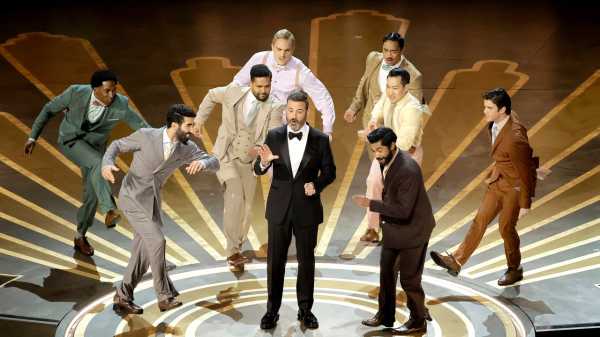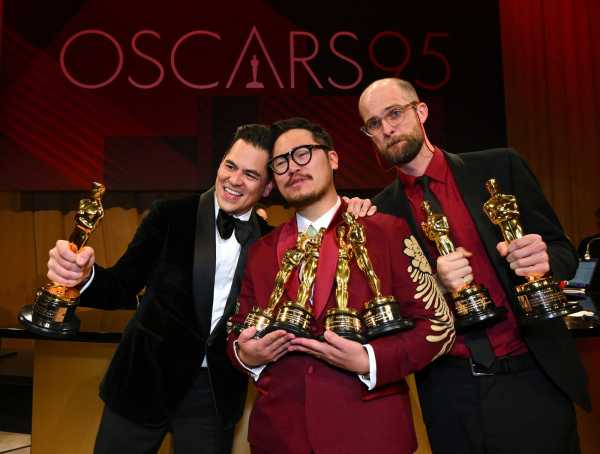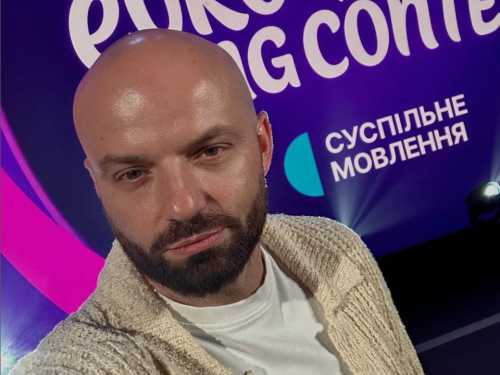
The Oscars ceremony was a pallid and watered-down entertainment, with little of what makes anybody care about movies. It felt like propaganda, and that—given the success of, say, Fox News—may indeed be a formula for a ratings hit. With Jimmy Kimmel as host and native advertising for Disney, Warner Bros., and the Academy Museum, this year’s broadcast was a razzle-dazzle commercial venture, a hectic sales pitch for Hollywood as a product and a value in and of itself.
The elephant in the room, of course, was last year’s slap, which gave the ceremony the kind of attention that the Academy didn’t want. Kimmel addressed it in his opening monologue, joking that, with five Irish actors up for awards, “the odds of another fight onstage just went way up.” A few sentences later, he joked about the “crisis team” mobilized by the Academy in case of “anything unpredictable or violent.” That team likely had little to do all night, but the entire ceremony felt, above all, policed. The illustrious array of presenters all seemed afraid to run afoul of the air of cheerful decorum that prevailed, as if anyone who spoiled the self-promotional smiley face of the evening would incur the wrath of the Academy and the industry at large. Though Dwayne Johnson, in the evening’s first presentation, dwelled on the etymology of “animation,” and Hugh Grant later called himself a “scrotum,” the notables charged with quipping and shticking en route to opening the envelopes and reading the winners’ names were as dutiful and cautious as executives at a shareholders’ meeting.
It was Kimmel who bore the burden of officially sanctioned edginess to balance the official pronouncements that he slipped in with faux offhandedness. The Academy membership snubbed “Till” and “The Woman King,” but Kimmel offered both films a thumbs-up in his monologue. He delivered the evening’s one sharp political joke, following the award for film editing, about the power of editing to “turn forty-four thousand hours of violent insurrection footage into a respectful sightseeing tour of the Capitol.” He was also tasked with delivering the only truly tasteless routine of the program, a faux viewers-write-in segment in which he got to ask Malala Yousafzai whether Harry Styles really spat on Chris Pine, made fun of Colin Farrell’s accent, and joked about (the absent) Matt Damon’s dubious hygiene. Nowhere did spontaneity seem ready to burst through the surfaces of the decorous and promotional cheer. Nobody, not Kimmel and not any of the presenters, appeared to feel tamped down or censored—the norms and standards seemed so deeply internalized as to become second nature.
As for the awards themselves, the era of good feelings prevailed there, too. It wasn’t much of a surprise that “Everything Everywhere All at Once” swept the board in the major categories in which it was nominated—it won Best Picture, Best Director (Daniel Kwan and Daniel Scheinert, a.k.a. the Daniels), Best Actress in a Leading Role (Michelle Yeoh), and Best Supporting Actor and Actress (Ke Huy Quan and Jamie Lee Curtis, respectively), along with Best Original Screenplay and Best Editing. The film’s combination of extravagant superhero-fantasy parody, endearing goofiness, and a deeply felt, personal, sentimental family story hit a sweet spot of benignly invigorating youthfulness. (For a sense of what happens at the Oscars with spikier fantasies, see how many statuettes Wes Anderson has won.)

From left to right: the producer Jonathan Wang and the directors Daniel Kwan and Daniel Scheinert pose with their Oscars for “Everything Everywhere All at Once.”Photograph by Angela Weiss / AFP / Getty
But the key to the movie’s success is the ingenuity of its casting. Quan, of course, after a quick launch as a child star, couldn’t, as an Asian man, make a living as an actor, and here he has his first major role in twenty years. Yeoh has endured the double obstacles of the dearth of roles for Asian women and middle-aged actresses. By putting these two performers (along with Curtis, too long stuck in minor roles in minor movies) into the spotlight, the Daniels have done more than expand the palette of the current cinema; they’ve expanded the future. These actors now take a long-deserved place in the industry; the Oscars they won last night prove the awards’ fundamental importance as markers of what the Academy members want Hollywood to be. Beyond the specific merits of “Everything Everywhere,” what its directors and the Academy have done is to set the stage for a range of future movies that would otherwise likely never have been greenlighted, not with these actors. Hollywood is the land of the effusive, but the participants in this movie who took to the microphone last night conveyed a sense of authentic mutual appreciation, and that, too, is the industry’s tune of the time.
What rendered the evening suspenseful was the backloading of the major awards, which were preceded by a batch of wins for the German film “All Quiet on the Western Front,” a movie that suggests the other side of the generational divide. It’s a stodgily literal and unimaginative film that convincingly conveys, with creamy audiovisual textures, that war is heck. It won for its score, for cinematography, and for production design, and received the Oscar for Best International Feature; its success is perhaps a shock but not a surprise. What did surprise me was Brendan Fraser’s win for Best Actor, for his performance in “The Whale.” His return, too, is welcome, after years of diminished onscreen presence, owing in part to personal problems, including depression, in the wake of his alleged sexual assault, in 2003, by Philip Berk, the then-head of the organization that runs the Golden Globes. (Berk has denied that he assaulted Fraser, claiming solely to have groped him “in jest.”) But Fraser’s return comes in a movie that shouldn’t have existed. It displays with an appalling literal-mindedness a conceit—a life defined by extreme obesity, portrayed by Fraser by means of makeup artistry that also won the Oscar in that category—that required theatrical imagination.
Sarah Polley’s film “Women Talking” is my favorite of the ten Best Picture nominees; though I harbored no hopes that it would win, I was at least delighted by Polley’s Oscar for Best Adapted Screenplay—it’s the script, which she adapted from the novel by Miriam Toews, that is the movie’s strongest achievement. And the Best Original Song win for “Naatu Naatu,” from S. S. Rajamouli’s historical action-fantasy “RRR,” strikes me as a similarly exemplary triumph for the art of movies over all—because, without the choreography (by Prem Rakshith) or Rajamouli’s direction of the scene that features it, the song would hardly have caught the Academy’s attention. The year’s biggest hits in the Best Picture category—“Avatar: The Way of Water” and “Top Gun: Maverick,” along with “Elvis”—came away with only a pair of technical awards between them. “Avatar” won for Best Visual Effects; “Top Gun: Maverick” for Best Sound. (The Tom Cruise action vehicle did give rise to the one true cinematic moment of the broadcast itself: the extended closeup of Lady Gaga as she performed the film’s Best Original Song nominee, “Hold My Hand,” which she co-wrote with BloodPop.) Ultimately, these films’ nominations, too, proved as dutiful, as blandly and unenthusiastically professional, as the benumbed broadcast itself. ♦
Sourse: newyorker.com






